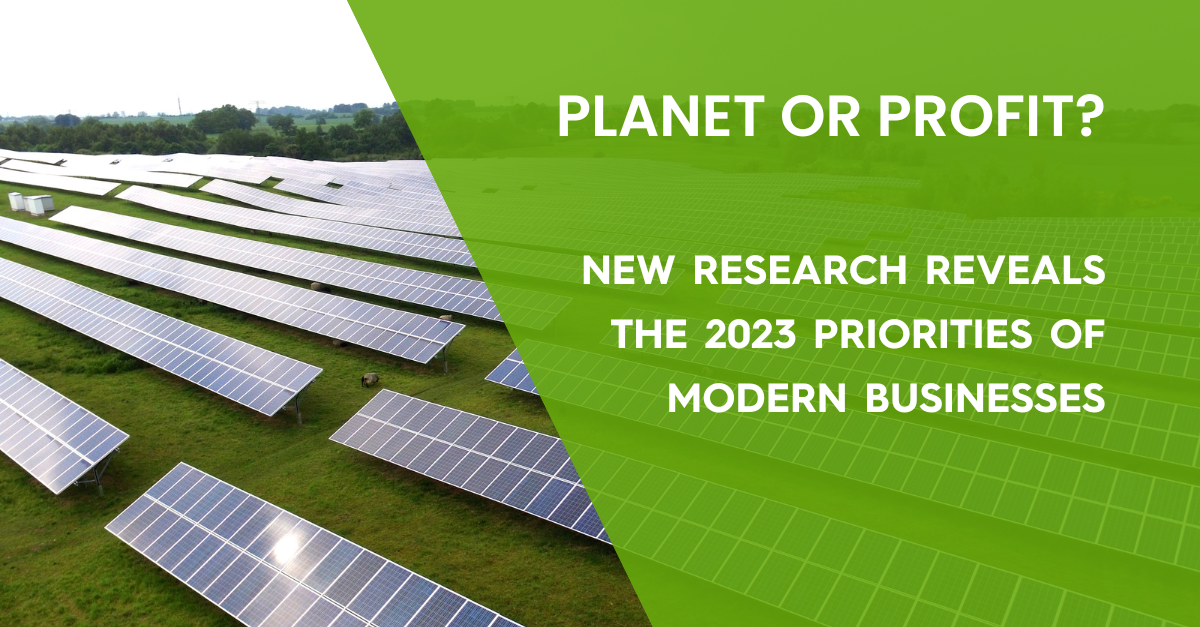
Decarbonisation, climate change, climate reporting, carbon emissions
Planet or Profit? New research reveals the 2023 priorities of modern businesses
Climate change is, globally, one of the main talking points across all industries. And with good reason. Deloitte’s 2023 CxO Sustainability Report: Accelerating the Green Transition has been released, transforming talking points into factual statements. The report sheds new light on the contemporary priorities of C-level business leaders (CxOs) worldwide. And in what will come as a surprise to pretty much no-one, climate change is rising to the top of the list of many businesses concerns.
Let's take a closer look at the dynamics shaping the decisions of CxOs, as well as the implications of this prioritisation. Because it begs the question: planet or profit?
Research results – a shift in business priorities
If the Deloitte report tells us anything, it's that for substantial number of global C-level business leaders, climate change is becoming a top-tier priority. According to the report, climate change has secured a spot in the coveted 'top three issues' for CxOs, beating out even innovation, talent competition, and supply chains.
However, climate change doesn’t stop at being simply a ‘concern’. CxOs are translating intent into action. A whopping 75% of these business leaders report an increase in sustainability investments within their organisations over the past year. What's more, a noteworthy 20% of them have marked this increase as 'significant,' meaning that maintaining sustainable business practices is of increasing importance.
Why are business leaders prioritising sustainability?
The Deloitte report illustrates how global uncertainty is driving this prioritisation, highlighting how business leaders are strategically adapting their priorities. Reasons behind this decision include:
- Long-term resilience - sustainability isn’t just about reducing this year’s energy bill. It’s a long-term resilience strategy, providing a stable foundation in unpredictable environments.
- Beyond profit margins - business leaders recognise a greater responsibility beyond the balance sheet.
- Addressing environmental challenges – stakeholders are demanding more environmental sustainability from businesses.
- Economic stability - businesses are acknowledging the importance of maintaining economic stability while simultaneously recognising the imperative of sustainability.
- Climate change legislation – governments are taking steps towards carbon reduction, including requiring businesses to provide clear and reliable data to reflect their carbon emissions.
“Our survey tells us that CxOs believe that both their organisations and the global economy can continue to grow while reaching climate goals and reducing greenhouse gas emissions,” says Jennifer Steinmann, Deloitte Global Sustainability & Climate Practice Leader.
“Leaders should also harness their optimism to drive sustained, measurable impact, which will require ramping up climate adaptation efforts while also facilitating innovation that ensures a just transition for all stakeholders.”
How can businesses better capitalise on sustainability?
In one of their more significant responses, the report indicates that businesses are increasingly directing their resources towards sustainability initiatives. Beyond the numbers, these strategic investments carry profound implications for businesses:
- Enhancing brand image - strategic sustainability investments contribute significantly to shaping a positive and responsible brand image. Companies that proactively invest in sustainable practices demonstrate a commitment beyond profit margins, resonating positively with stakeholders and customers alike.
- Market positioning - businesses leveraging sustainability not only meet customer expectations but position themselves as industry leaders in responsible practices.
Strategic sustainability investments drive innovation, providing businesses with a unique avenue for differentiation. Beyond the ethical imperative, this innovation becomes a means of staying ahead in the race, meeting customer expectations, and capitalising on the burgeoning market for eco-conscious products and services.
What's next for sustainability in business?
It’s worth noting the trajectory we're seeing — the prospect of sustainability overtaking economic outlook as the number one priority for businesses. What was once a subtle contender is steadily asserting itself as a focal point in the strategic considerations of CxOs.
Future-proofing through sustainability
The implications highlighted in the report introduce a compelling concept — future-proofing through sustainable practices – in other words, they’re focusing on long-term resilience and adaptability. Businesses that embrace this shift not only respond to current expectations but position themselves to navigate the uncertainties of tomorrow. This kind of future-proofing is going to become increasingly necessary in a topsy-turvy world.
Conclusion - prioritising climate change today for a sustainable tomorrow
As the Deloitte report has clearly shown us, climate change ranks among the top priorities for a significant number of global CxOs. From being a consideration in the boardroom to a top-tier priority, climate change demands attention, and may even overtake economic outlook as the number one concern for organisations worldwide.
Is your organisation on the same trajectory? If your sustainability journey is just beginning, our Carbon Roadmap is the ideal resource to get you started.
